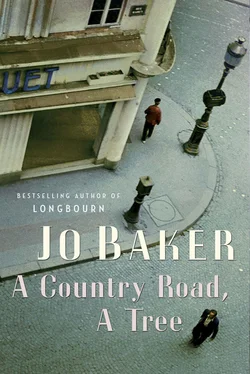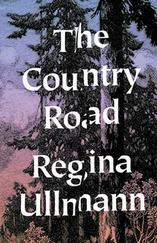The blankets are thrown back on the bed, the pillows are still dented with the press of their heads; the few clothes he is not actually wearing are slung over a chair. Suzanne is outdoors in the cold, digging over the ground, preparing it for the first seeds.
He has the old coat on, the collar drawn up, the mitts that Suzanne knitted on his paws, his muffler up over his nose. This room is right above the wood-burning stove and is the warmest part of the upper floor, but when the wind blows it whips the warmth away and even here it’s cold. He only notices afterwards.
Because the words now come. With a curve and loop and dip and stroke. The words keep happening, and he will not think too much about their coming but just let them come. At the foot of the page, he blows upon the wet coils, then turns the leaf and folds it flat, and on the verso the words go on, loop and dip and twist, as they have gone on now for weeks together. A stalagmite of heavy notebooks grows on the desk beside him.
From time to time there’s the cry of circling crows, or the noise of a horse and cart slowing for the turn at the crossroads. An occasional motor vehicle. People pass from time to time, exchange a few words, but it’s there-and-gone and does not intrude on his own words.
And so he thinks of none of it: not the presences nor the absences, neither the wide expanse of sky beyond his window nor the close grain of the wood under his hand, though all of it was necessary for this quiet alchemy to happen.
—
Writing lets him step aside, and time flows on without him. He sips his just-made cup of corn coffee and it’s ice-cold; he looks up from the morning and the light has gone. His shoulders ache. There’s a snag in his neck. Then headlamps blur the dark — and he gets to his feet, but he’s too slow to see the truck pass and so doesn’t know whether it was a patrol, or if it is one of the few remaining delivery vans, rigged up to run on gas, or wood chips, or old cooking oil.
You keep on going, don’t you, after all? The horrors build. You keep on doing what you do, out of spite.
He turns away from the window and his desk; he wraps his arms around himself and shivers and clumps downstairs. Suzanne isn’t there. He opens the back door and blinks out at her, standing in the chill spring evening, surveying her dug-over patch. Her hands are red with earth.
“Is that you?” she says. She looks round and her face is streaked with red.
“It is,” he says. “I was writing.”
“We’re almost out of firewood,” she says.
—
Newcomers still turn up in the town. They stumble off buses and hole up in the hotel. He makes friends there, in ones and twos, not by the half-dozen. Henri Hayden becomes a companion over chess; he’s an artist, and a blessing. In the evenings, they gather at Miss Beamish’s, Henri and his wife, Josette, he and Suzanne, Miss Beamish and her companion, also called Suzanne. They listen to the radio.
This is just another bubble. The bubble’s shrinking.
A farmer is shot dead. One bullet, neatly through the brain. The blood dries in the red soil. It’s known who killed him; it’s never spoken of. There’s a cloud around the man who did it, a haze of flies. Because this was a neighbour; this was somebody known to them all, over long years, the family over generations. The farmer had found a crate of cigarettes where there should not have been a crate of cigarettes. He reported it. He allowed the information to flow along the proper channels, rather than damming it or forcing it back upon itself, making it flow uphill.
When he sits alone and writes, it is to push against the closing walls of the bubble. The sides flex outward, just a little; he feels that he can breathe. When he blinks, his eyes feel sore against the lids. He’s always tired.
The prose creeps. Notebooks fill. A soft evening in Ireland, a redbrick villa, and the elderly and lame and syphilitic. An unseen man upstairs, dishing out pabulum, approval and opprobrium, entirely arbitrarily.
His handwriting shrinks too and becomes more careful. Everything is reduced, condensed. He commits just the essence of the thing to paper. Anything more than that would be a waste.
And when he surfaces to a cramped hand, a crick in the neck, the sunlight shifted across the floor, a sore blink, he knows that even to have written this little is an excess, it is an overflowing, an excretion. Too many words. There are just too many words. Nobody wants them, nobody needs them. And still they keep on, keep on, keep on coming.
At night, when they gather — he and his Suzanne, Miss Beamish and hers, sometimes the Haydens — to listen to the radio at Miss Beamish’s house, he notices that the gnomic messages on Radio Londres are increasing. They take up more and more of the broadcast time. The gathered company strain their ears through the noise and clutter of the attempts to block the signal, to catch hold of the surrealist fragments and Dadaesque cut-ups that mean something to somebody somewhere. The elephant broke a barricade. I repeat, the elephant broke a barricade…The blue horse walks on the horizon…Giraffes don’t wear false collars…Aunt Amélie cycled in shorts. Sometimes, in Miss Beamish’s sitting room, a head is shaken at the strangeness; sometimes an eye catches another eye and there’s a smile. The poetry of these utterances is intriguing. There are secret parcels and packets of meaning attached to them; they go unseen by all but the intended recipient.
—
The sun shines, and the leaves unfurl, and the shade deepens blue again beneath the trees, and the grapes swell, and in the streams the fish become fat and sluggish, and the birds hop through the inner storeys of bushes like they do every year; flights of them skim above the houses and through the town, and the boys take potshots at them, sharp-eyed and practised, and the women pluck the moth-light bodies and cook them so that the flesh falls from their greenstick bones.
He has become a creature of wire and rope: muscle twists over bone; tendon shifts under skin; skin becomes as brown as tea. He moves freely, lost in the mechanics of labour, less conscious of his physical self than he has been since he was a child. The stone sits in a cheek, is turned over, sent to rest in the other cheek. In solitude and silent work, his thoughts shift and slide across each other. There are patterns forming; they can be glimpsed in the corner of the eye. It doesn’t do to look directly: the pieces drift away like ice. But later, to sit down at his desk, to fill his pen, to trace this across a notebook’s whiteness, is to conjure the patterns back. To write is to drift along with the floe; it is to let the floe drift through him.
He walks out with Henri, and they drink a bottle of wine on a café terrace.
At night, he sleeps his black sleep, and it washes him quite clean.
When the day is bright and calm, and the mistral doesn’t blow, and there’s a warmth to the sunshine, and the air is sweet, and when in the evenings there is light and time and space to write in, it is all too easy to forget that their good luck is just the luck of the crow in the woods, the luck of the merely overlooked.
Fie on’t! O fie! ’tis an unweeded garden,
That grows to seed; things rank and gross in nature
Possess it merely.
Henri Hayden can be heard well before he’s seen; he declaims the lines as he’s coming down the road. Irish and French sounds bulge out of the English verse, along with his native Polish.
He gets up from his seat and peers out of the window. His friend has a Collected Shakespeare clamped under his arm and is striding along with the ungainly confidence of the half-cut, having been to Miss Beamish’s for an English lesson. Miss Beamish is not a methodical teacher, but she is liberal with her rewards. He raises a hand and Henri pauses in the street, swaying slightly. They talk over the balustrade.
Читать дальше










